Sleep. There’s no hiding from it. You can postpone it as much as possible, but it’ll eventually claim you. Rather than fight it or bemoan how little sleep you’re getting, it’s best if you learn to use sleep to your advantage. If you do, you’ll be fighting fit on all fronts – everything will seem more possible and life will be filled with a base layer of energy.
It’s easy to see why not prioritising your sleep makes your life not just more difficult, but a slog from minute one. According to some research from the University of Chicago, a four to five-hour sleep can reduce a man’s testosterone levels to that of a man 10 to 15 years his senior. Its biological power must not be underestimated. A lack of sleep is fundamental to our everyday existence.
Sleep is the literal recharging of our batteries, but it’s often overlooked. Perhaps that’s why you’re reading this article. We’re all guilty of neglecting sleep from time to time, whether that’s staying up until 3 a.m. sauntering through the latest video game release or talking about everything and anything with a new partner – we all know how important sleep is yet we often choose to deal with the consequences of it’s absence. Matt Walker, a psychologist who has dedicated his career to learning more about sleep, put it this way:
“Human beings are the only species that deliberately deprive themselves of sleep for no apparent reason.”
It’s time we changed that. Getting a good night’s sleep is about getting the little things right – from the activities you do before sleeping to the time you wake up every day. It may sound simple, but as with a lot of things in life, the simple things are often the most challenging to get consistently right. Here are some small tips to help change that.
Consistent wake-up times
The human body craves routine. Regulating something as biologically pivotal as sleep makes it easier to achieve – your body and mind will find it difficult to calm down if they have no idea when that might happen. So, if you have no consistent wake-up time, it will be difficult to expect an easy start to the day.
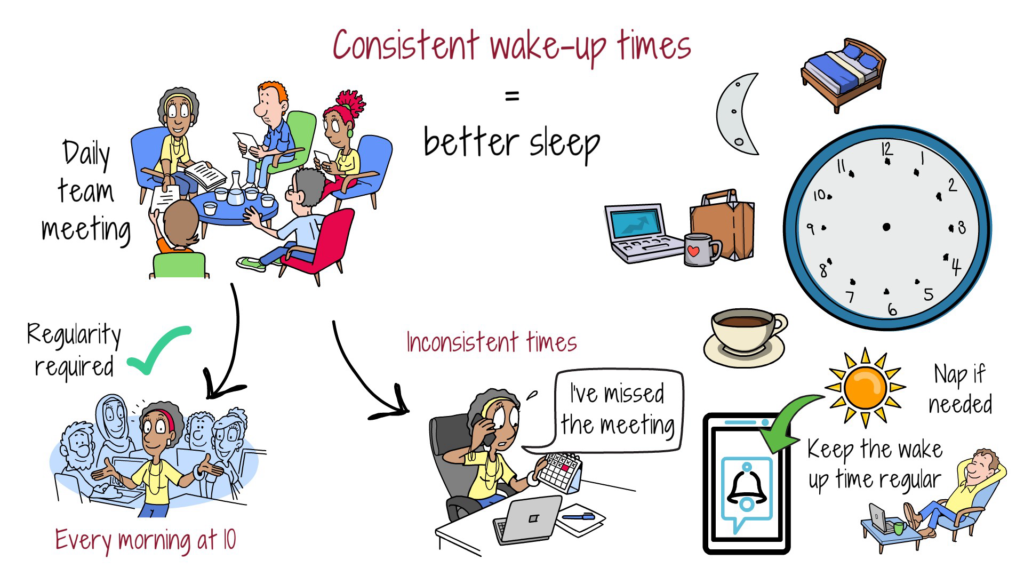
To put it into context, say you have a daily team meeting every morning at 10:00 a.m. You know it’s at 10 every day – your brain and body brace for it. Now, let’s say the same meeting is moved – 9 a.m. one day. 2:47 pm the next. It’s skipped for three days, and then all of a sudden you’ve missed the next scheduled one. The constant change would throw away any sense of togetherness and cohesion. You’d start missing things, not just in the confines of the daily meeting, but otherwise too. It’s difficult to split your attention if there isn’t any regularity.
In conclusion, you will get better sleep if you have consistent wake-up times. Even if you go to sleep late, try and wake up at the regular time. Although the temptation is to get as much as possible in one go, sometimes a similar wake-up time followed by a nap later in the day is the best way to get your hours in and stay regulated.
Daily wind-down ritual
Blue light. You may have heard of it – the dreaded glare that is harmful to your eyes from excessive screen use. It’s damaging to your ability to sleep yet, according to the Sleep Foundation – 90% of Americans use a blue-light emitting device during the hour before bed. It’s not just the purely biological element to be aware of either, as seeing something happy or sad on social media can upset your emotional balance and make it more challenging to induce the REM cycle – the portion of sleep where your brain is in its deepest state of rest.
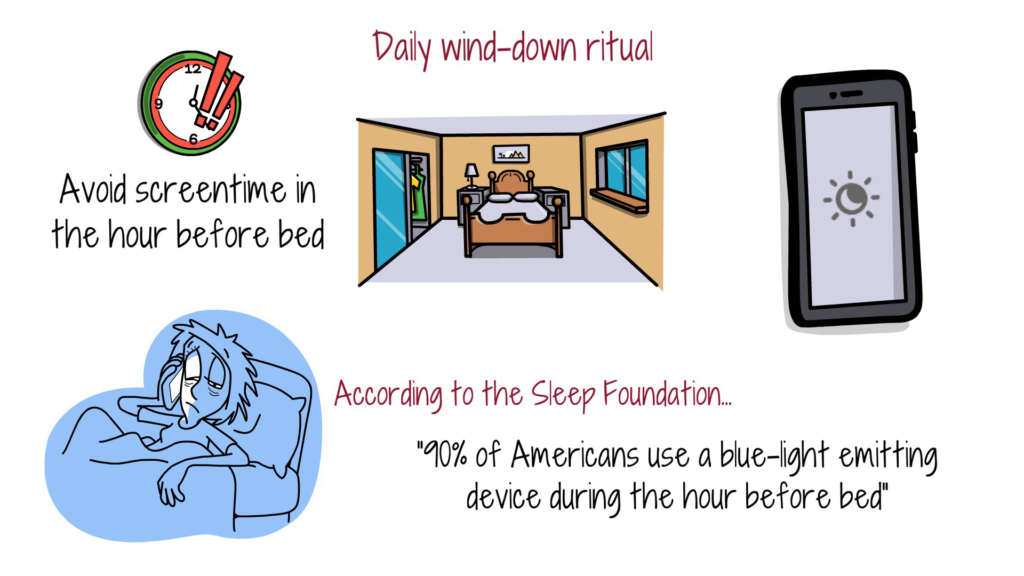
So, a good place to start when implementing a daily wind-down ritual is to avoid screentime in the hour before bed. In this day and age that can prove difficult, so look on your device for a blue-light saving option. On Apple devices, look for ‘night mode.’
Otherwise, how you wind down is up to your personal preference. Here are some tips to get you started:
- Listen to some calm, slower music before bed. Much has been made of music’s ability to influence our mental and physical state, so experiment with whatever music makes you feel calm.
- Have a skin-care routine. To induce a relaxed state of being, your body needs to feel at ease. Taking care of your face before you sleep is a powerful, physical way of going through the motions – as if rubbing in some cream or ointment signals it’s time to shut off.
- Read before sleeping. Reading a book is a tried and tested way to unwind before a night’s rest. While you may feel the highs and lows of emotion, the act of reading a non-blue-light emitting text will eventually tire you out. Plus, it’s excellent material for your dreams.
Optimal sleep environment
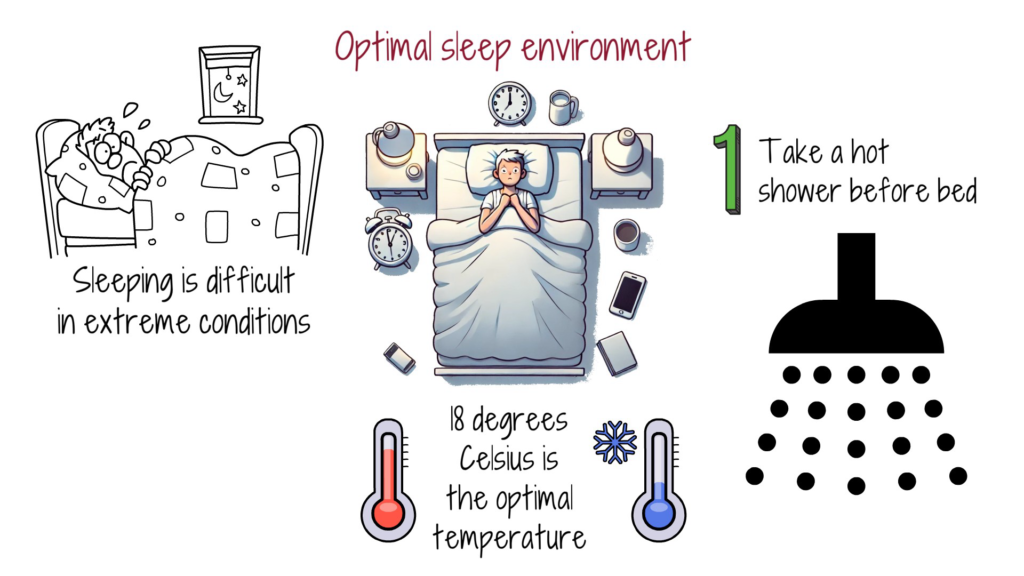
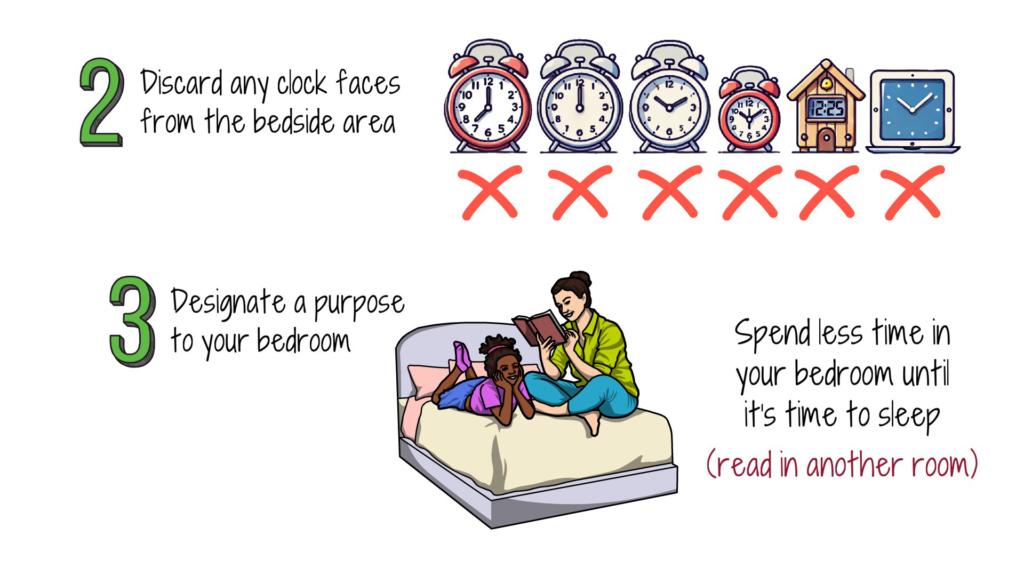
It’s all well and good getting your mind and body to relax, but if your sleeping environment isn’t geared toward the main goal of a bedroom, then you might have a difficult time getting the rest you need.
You may experience difficulty sleeping in extreme conditions. In the height of summer, for example, it can prove challenging to relax when you’re sweating in bed. Research into sleep found that 18 degrees Celsius is the optimal temperature for falling asleep. Of course, it’s not easy to regulate a whole room’s temperature, so your best bet is to make things cool. If there’s too much of a chill, there’s no better feeling than wrapping yourself in a duvet.
Here are three useful, practical tips for creating the optimal sleeping environment:
- Take a hot shower before bed. The heat from the water creates a ‘warm-up effect’, whereby your core temperature is forced to drop to cope with the heat on the skin.
- Discard any and all clock faces from the bedside area. Of course, we all like to know what time it is so we can gather our bearings. Still, if you have difficulty falling or staying asleep, a continued reminder of how much sleep you’re losing will push unwanted anxiety and frustration onto you.
- Designate a purpose to your bedroom. Your bedroom is the room you sleep in, right? While that may be the case, you often spend more time in your bedroom than anywhere else. When it becomes the place where you do everything, your brain may find it challenging to relax as it hasn’t purely associated the room with the main activity it’s for – sleeping. So, if you’re struggling, spend less time in your bedroom until it’s time to sleep.
Mind dump journaling
Picture this: you’re ready for bed. Skin is glowing, your room is cool, and you’ve not been on your phone in over an hour. Yet you can’t sleep. Your mind is racing, creating hundreds of imaginary scenarios and excruciatingly overthinking every interaction in the past five years. Sound familiar?
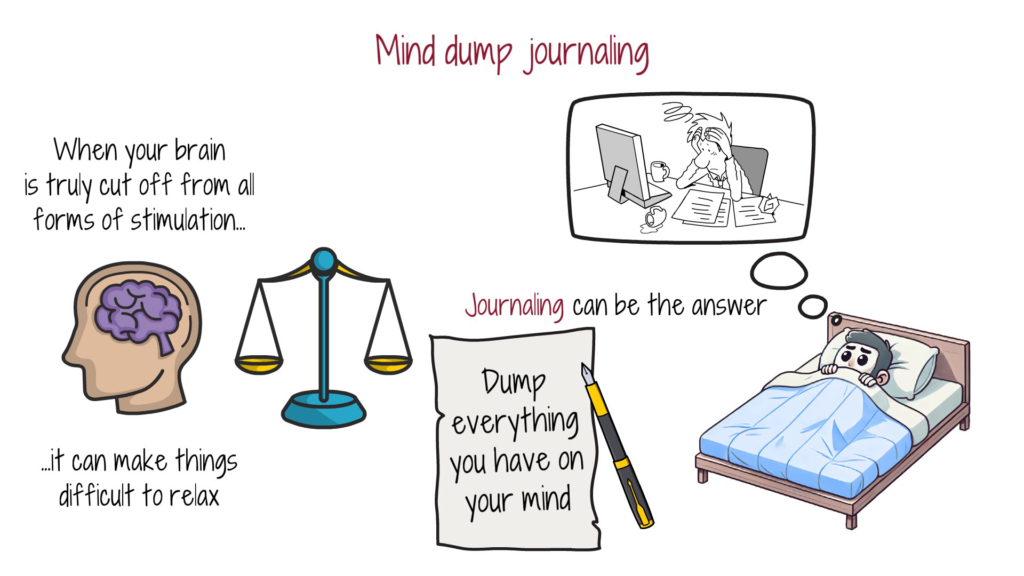
Sometimes, the moments before you sleep are the only time in the day when your brain is truly cut off from all forms of stimulation. No music, company, or tasks to complete. Just you and your thoughts. It’s that freedom that can make things especially difficult to relax.
To counterbalance this effect, try journaling. Dump everything you have on your mind. It doesn’t need to be interesting or well-written, it just needs to be. Your brain doesn’t need to go down every avenue it creates. Sometimes, it simply needs to be given the time to spew out all of the excess to make way for rest just so it can go through the same process all over again.
A short period of regular journaling will help you realise just how much information the brain processes every day. Let the paper have some so you can shut it off.
Better sleep is within your grasp
You don’t need dozens of stats stating how a lack of good quality sleep can negatively affect your life. You know how much worse you feel when you get five hours compared to a solid eight. It makes everything seem much more possible.
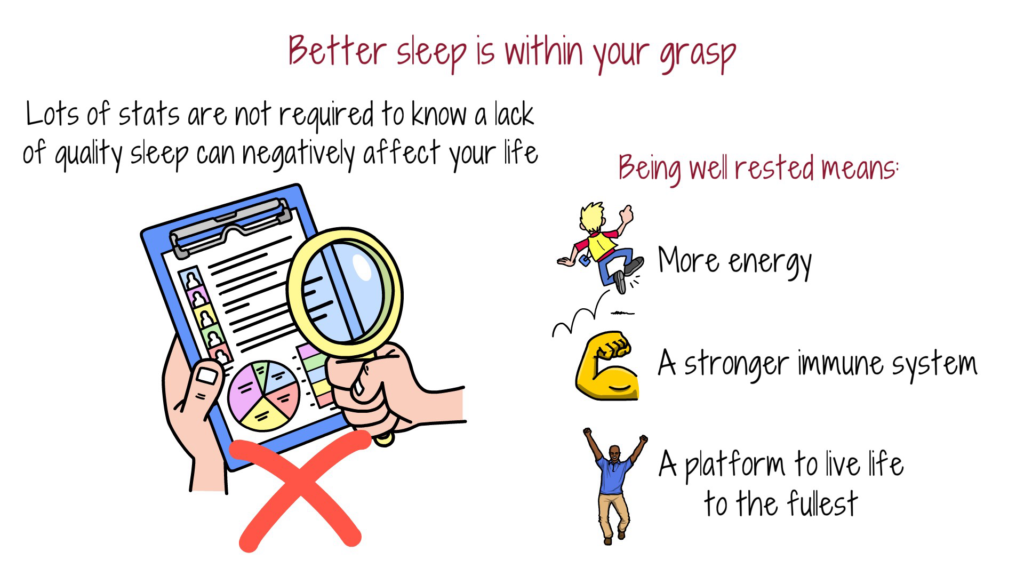
If there’s any part of your improvement journey to focus on, let it be sleep. As this article has discussed, when you’re well rested, you’ll have more energy, develop a strong immune system and give yourself the platform to live life to the fullest.
How do you induce sleep every night?
